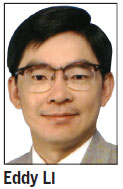Solution to political impasse still possible
Updated: 2014-07-24 05:52
By Eddy Li(HK Edition)
|
|||||||||
Recently NPCSC Chairman Zhang Dejiang met Hong Kong government officials, pro-establishment leaders and Basic Law Committee members in Shenzhen.
The meeting comes at a time when divisions over constitutional reform in Hong Kong have intensified.
At least three recent developments explain this: First of all there is the anti-"Occupy Central" petition launched by the Alliance for Peace and Democracy, which received 380,000 signatures in just two days; second, after Zhang met and communicated with Hong Kong political and business leaders, a message was delivered to show the central government's sincerity about universal suffrage in Hong Kong. This is widely accepted and acknowledged by the majority of people; third, Anson Chan (convener of Hong Kong 2020) and Martin Lee (founder of the Hong Kong Democratic Party) visited the United Kingdom seeking "help" with regards to Hong Kong's future democratic development, though they received little attention in the UK.
Prior to the start of the second phase of public consultation on Hong Kong's constitutional reform, it is significant to note that Zhang traveled south to Shenzhen so he could re-emphasize the stance of the central government. As quoted by those who met him there, Zhang said Beijing's position could be summarized in three points: It sincerely hopes Hong Kong will achieve universal suffrage for the CE election as scheduled in 2017; the model for the 2017 election will not be the ultimate destination of constitutional reform and there will be scope for electoral procedures to be gradually refined and improved; the new CE should be a person who "Loves the Country and Loves Hong Kong".

From 2002 to 2007, Zhang Dejiang - who was appointed immediately after the outbreak of SARS in 2003 - held the post of Party Secretary of Guangdong. During his tenure he was concerned about the potential impact of the SARS crisis. Zhang observed how Hong Kong recovered from the outbreak following the implementation of the Individual Visit Scheme for four Guangdong cities (Dongguan, Jiangmen, Foshan and Zhongshan).
As the current head of the central government task force on Hong Kong and Macao affairs, he is familiar with recent developments in the city. Zhang's latest discussions on the central government's position will help ease tensions in Hong Kong over political reform. They will also help to encourage discussion on the second phase of the consultation based on the Basic Law and relevant decisions of the NPCSC. Hopefully after this a fair, workable solution, acceptable to most Hong Kong people, can be developed.
In Shenzhen, Zhang also mentioned his concerns about foreign intervention in Hong Kong affairs. We must not take this lightly. There are foreign countries who want to influence developments on the mainland and to use Hong Kong as a stepping stone in this. His comments naturally recall the visit by Anson Chan and Martin Lee to Britain. The pair complained to the British about Hong Kong's democratic development and said the "One Country, Two Systems" policy was not working. But when questioned by British officials, they were reportedly unable to cite specific examples. Upon their return to Hong Kong, Lee tried to convince the media they were "obviously" ignored because China is offering British companies so many business opportunities. Lee used the word "obviously" four times. Well, he and Chan "obviously" made no impact during their visit!
In reality over the past 17 years the "One Country, Two Systems" policy has been quite successful. It was an innovative idea although its implementation was not always easy because no precedent existed. This is why the central government has so far not intervened in Hong Kong during radical or even illegal conduct in the SAR. The international community has been able to observe the moderate stance Beijing has taken.
Hong Kong's electoral reform is ultimately a domestic affair of the "One Country". There is no room for foreign involvement. Countries such as Iraq, Egypt, Afghanistan and Ukraine are good examples of how damaging foreign interference can be. The situations in each of these nations were complicated by the involvement of foreign forces intent on exploiting prevalent domestic unrest. This is a bit like putting a cat near a goldfish bowl. It is something we cannot treat lightly.
The author is vice-president of the Chinese Manufacturers' Association of Hong Kong.
(HK Edition 07/24/2014 page9)